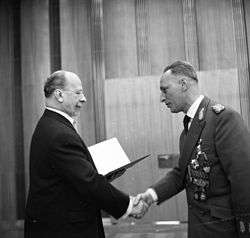Heinz Kessler
| Armeegeneral Heinz Kessler | |
|---|---|
 Heinz Kessler in 1988 | |
| Minister of Defence | |
|
In office 3 December 1985 – 18 November 1989 | |
| President | Erich Honecker |
| Prime Minister |
Willi Stoph Hans Modrow |
| Preceded by | Heinz Hoffmann |
| Succeeded by | Theodor Hoffman |
| Personal details | |
| Born |
26 January 1920 Lauban, Province of Lower Silesia, Weimar Germany |
| Political party | German Communist Party (since 2009) |
| Other political affiliations |
Communist Party of Germany (1945-1946) Socialist Unity Party of Germany (1946-1989) Party of Democratic Socialism (1989-1990) |
| Spouse(s) | Ruth Kessler (died 2013) |
| Awards |
|
| Military service | |
| Allegiance |
|
| Years of service |
|
| Rank | Armeegeneral |
| Commands |
Commander-in-chief of the Kommando LSK/LV Ministry of National Defence |
| Battles/wars |
World War II Warsaw Pact invasion of Czechoslovakia Angolan Civil War |
Heinz Kessler (or Heinz Keßler; born 26 January 1920) is a German politician and retired military officer. He was an Armeegeneral in the National People's Army (Nationale Volksarmee - NVA) of the German Democratic Republic (GDR); Minister of Defense of the GDR; a member of the Politbüro of the Central Committee of the Socialist Unity Party of Germany (SED); and a deputy of the GDR's Volkskammer (parliament). Convicted for his role in the crimes of the SED regime, he was sentenced to seven-and-a-half years in prison after German reunification. He served his sentence in Hakenfelde Prison, and was released from prison in 1998.
Biography

Kessler was born into a communist family in Lauban, Lower Silesia. He joined the Red Young Pioneers, the youth organization of the Communist Party of Germany (KPD), at age 6. He later apprenticed as a motor mechanic.
Drafted into the Wehrmacht in 1940, he deserted to the Soviet Red Army shortly after the German invasion of the USSR. Upon returning to Germany in 1945, Kessler joined the KPD in the Soviet occupation zone, which merged with the Social Democratic Party (SPD) in the Soviet zone in 1946 to form the SED. Also in 1946, Kessler became a member of the SED Central Committee.
He was appointed Chief of the Air Forces and Air Defense (Luftstreitkräfte/Luftverteidigung) of the NVA in 1956, and as deputy minister of defense in 1957. He became Chief of the NVA Main Staff (Hauptstab - General Staff) in 1967, with the rank of Generaloberst (Colonel General). Simultaneously, he also became a member of the Military Council of the United High Command of the Warsaw Pact.
Kessler was promoted from Chief of the Main Political Administration (Chef der Politischen Hauptverwaltung) of the NVA to Defense Minister (with the rank of Armeegeneral) on 3 December 1985 after his predecessor, Armeegeneral Heinz Hoffmann, died of a heart attack.[1]
Shortly after German reunification on 3 October 1990, Kessler was tried in a German court for incitement to commit intentional homicide, for his role in the deaths of people who tried to flee the GDR between 1971 and 1989. On 16 September 1993, Kessler was found guilty of manslaughter and was sentenced to seven-and-a-half years in prison.
Kessler filed an appeal to the European Court of Human Rights, claiming that his actions were in accordance with GDR law and meant to preserve the existence of the GDR. However, his appeal was denied largely on the basis that the GDR's policies violated international human rights.[2]
Kessler served his sentence in Berlin-Hakenfelde prison from 1993 to 1998, and was released after serving nearly five years.
Kessler was expelled from the Party of Democratic Socialism in 1990. In 2009, he joined the German Communist Party (DKP). He was a DKP candidate in the Berlin state election, 2011.
| Wikimedia Commons has media related to Heinz Keßler. |
Notes
- ↑ Flow, V.B.. "A New Defense Minister for the GDR." December 23, 1985.http://files.osa.ceu.hu/holdings/300/8/3/text/27-2-197.shtml (accessed September 8, 2007).
- ↑ Registry of the European Court of Human Rights. JUDGMENTS IN THE CASES OF STRELETZ, KESSLER AND KRENZ v. GERMANY AND K.-H. W. v. GERMANY. Strasbourg: Registry of the European Court of Human Rights, 22 March 2001.
| ||||||||||||||||||
|